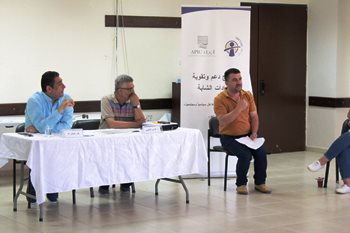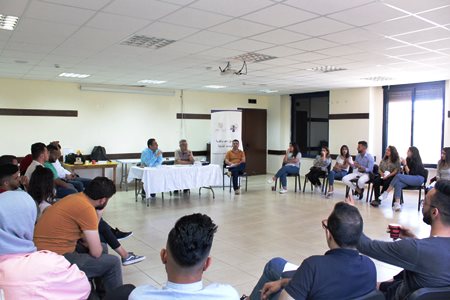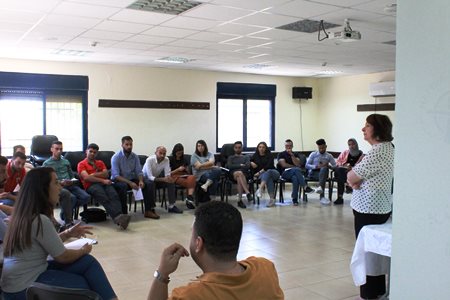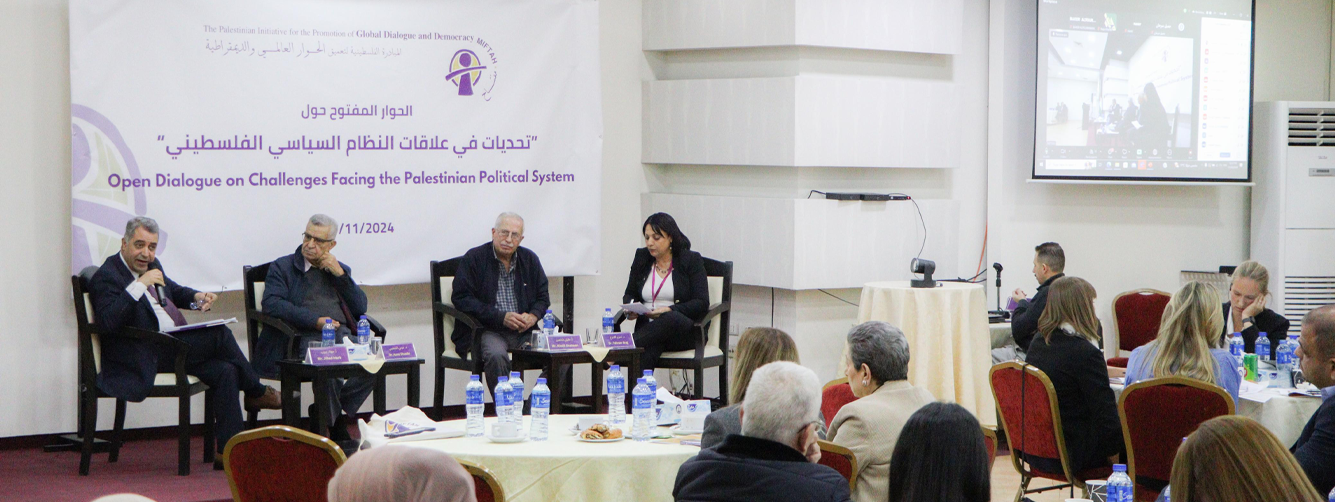
Ramallah – On July 6, MIFTAH capped off six days of training on social transformation aimed at promoting youth participation in the Palestinian political system and providing them with the necessary skills for understanding their sociopolitical surroundings and enhancing their capabilities in developing joint action skills. The workshops were attended by members of the Palestinian Political and Social Active Youth Network.
The training focused on the empowerment of youth leaders by providing them tools for analysis of the sociocultural framework and components in Palestine and its reflection on the structural and systemic frameworks of the Palestinian political system. It also aimed to provide them with skills that promote the participants’ abilities to recognize basic needs for formulating real goals for the Youth Network that reflect their needs and aspirations and represent the priorities of collective youth action towards promoting their political status and partnership.
Over the course of the training, several sessions were held on issues such as: national efforts to revive PLO institutions including the General Union of Palestinian Women, aimed at highlighting the mechanisms for promoting youth participation in the political system, especially in PLO institutions. PNC member Rima Nazzal was invited and spoke about the efforts being made to revive the GUPW and the available opportunities for youth to become involved in national actions through PLO institutions and unions. She stressed on the importance of the role of youth leaders in creating a structure for a system capable of representation and which involves all social sectors.
Another session was held on Palestinian diplomacy within regional and international transformations and the role of Palestinian youth in supporting Palestinian diplomatic efforts through reviving General Union of Palestininian Students [GUPS] branches throughout the world.
In this session, Dr. Omar Awadallah, President of the UN General Directorate and its human rights organizations at the Ministry of Foreign Affairs presented. He reiterated the importance of youth involvement in political and field action, considering this an important factor in promoting their role and ability to give and be innovative. He explained there was a new employment policy at the Ministry of Foreign Affairs, which offers youth opportunities including training at the ministry’s departments.
Dr. Awadallah spoke of the achievements made by Palestinian diplomacy abroad, reaffirming that youth are the reason for this elevation of diplomacy because they are now occupying important positions. He called on them to form groups and forums and to work together to assert their rights. “Youth played a role in leading the campaign for UN General Assembly Resolution 19/67, which granted Palestine the status of nonmember state. After that, Palestine then became a full member in UNESCO. With efforts from these youths, Palestine succeeded in joining a number of international treaties and start a new stage of Palestinian diplomatic action in holding Israel accountable for its daily violations in the Palestinian territory.”

Regarding the Palestinian political narrative, Awadallah said, “This narrative must be turned into a demand to end the Israeli occupation of the state of Palestine, to eventually arrive at full national independence.”
Another session was held on ways to promote the role of youth in monitoring government spending and public action based on the youth political document, which was a result of several dialogue sessions attended by representatives of political factions and parties and student councils in Palestinian universities.
Dr. Azmi Shuaibi, consultant for the AMAN Board of Directors, began his presentation by giving a historic briefing of the PLO’s establishment, considering it the home of the Palestinian people and the embodiment of their national identity. Shuaibi explained that the PLO’s representation of the people culminated in the international and Arab recognition of it in 1974 as the sole and legitimate representative of the Palestinian people, the disengagement with Jordan in 1988 and followed by the Palestinian Declaration of Independence. Also, PLO took two important decisions that same year: renouncing violence and adopting negotiations as the means to regain national rights. The second decision was agreement over establishing a Palestinian state on the 1967 borders.
Regarding the role of youth, Dr. Shuaibi said there was a strong link between the future of these youths, democracy, combatting corruption and development, through providing the appropriate job opportunities. “In Palestine, not only has corruption not waned, but the people’s trust in their leadership has weakened as well, while youths have lost their trust in change.” Still, Shuaibi said youths have the sufficient capabilities to create change, calling on them to take an interest in collecting and analyzing information.
Shuaibi spoke about the idea to form the AMAN coalition. “The idea for AMAN is to achieve accountability; corruption has weakened our national capabilities and has given the enemy material to use against the demand for our rights. This is where the role of youth comes in and the importance of youth becoming involved in combatting corruption through organized institutional action.” He maintained that there were only few corrupt individuals in the PA but the problem is that this minority is in control of decisions because of their positions. “The Palestinian people have the lowest rate among Arab peoples in terms of corruption and employee bribes, because this is related to the concept of national and personal dignity and the negative experience of corruption under direct occupation. Back then, to get any transaction done, you needed to pay a bribe to someone in exchange for the required services.”
Shuaibi encouraged youths to combat corruption whenever possible. “Any youth group that has the ability to prevent corruption must take the initiative without hesitation. They could start with their neighborhood and demand that officials are held accountable for any shortcoming or corruption as long as they have correct and accurate information. The law protects whistleblowers.”
Shuaibi concluded by reiterating the relationship between elections and democracy and their ability to promote the role of youth. “Periodic elections are very important and democratic methods promote and strengthen the role of youth.”
Prior to this training, MIFTAH had completed a three-day workshop on social transformation for members of the Palestinian Political and Social Active Youth Network, using the KUMI methodology. The participants received theoretical and practical training on identifying goals through the interactive spaces available to youth. The training was based on the needs of the network’s members and exploration of the surrounding environment and its sociopolitical components in order to invest in these spaces for youth. The aim of this was to create an integrative climate among Youth Network members as part of efforts to empower youth leaders in joint action to change social systems and structural frameworks that coincide with their needs, rights and aspirations.
Participant views
Member of the Palestinian Political and Social Active Youth Network, Anas Qannab said the training raised several important questions for the participants, all of which were eventually answered. “We were able to voice our needs as individuals and the goals we hope to achieve in our communities. Based on this, we benefitted both at the personal level and in terms of practical action on the ground through the Youth Network and the KUMI methodology, which is based on social transformation.”
Another Network member, Rina Al Haj Abed said the training was ‘one of a kind”. She said it gave her the ability to ponder principles in life allowed her to find a way to be what she wants including achieving her goals at the personal and social level through collective rather than individual action. “I think we can take advantage of this training to build positive character, which will inevitably reflect on society as a whole,” she said.
As for Network member Dina Dib’i, she said there was very good interaction and communication between the trainers and trainees, adding that the training allowed her to revisit her previous experiences in the Youth Network and apply what she learned in various political and social fields.
A veteran member of the Network, Thaer Hanaysheh spoke about the new skills and abilities he acquired in the training, most importantly, “how to identify our needs as youth and link them to the Network’s goals.” Hanaysheh continued, “We were able to determine in detail the goals we want; we focused on them in association with certain activities that are important to us members of the Network, especially regarding the media and the importance of using it in activities and for achieving our goals and linking them to the bigger goal of the Youth Network.”

MIFTAH coordinator for the Youth Empowerment Program Hassan Mahareeq said the training and its dialogue and consultation sessions were part of the program’s interventions in cooperation with the Arab-Palestinian Investment Company [APIC]. MIFTAH’s program aims at promoting good governance in Palestine and guaranteeing the participation of youth in policy formulation and decision-making positions. This, he explained, is achieved by equipping youth with the necessary skills and competencies to have impact at the local and national levels and empower them to exercise their role in the change process in order to build a democratic civil society in Palestine.
The training was facilitated by a team of young leaders well versed in the KUMI methodology, which MIFTAH and a group of local and international experts helped to develop as the primary tool for prompting social sectors to become involved in the process of social transformation and ultimately reach a consensuses that rises above individual considerations and produces collective solutions to best serve public interests.
The KUMI methodology is a tool for organization in conflict situations. It is a process through which individuals and groups in conflict (social and political) are able to ponder the root causes of the conflicts and collectively mobilize for creative and alternative solutions. KUMI combines research and expertise in the fields of conflict transformation and grassroots organizations. It provides a means of transforming contexts in which conflicts arise. This methodology is used in workshops by capable facilitators, who work with groups over a considerable period of time and through a process that includes accurate preparation and follow-up, aimed at providing a tool that could be used for conflict transformation and collective (political, organization, social) action.










